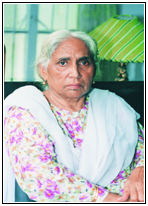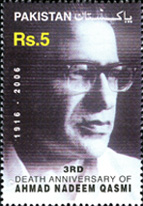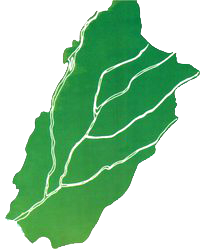Qasmi, Farkhanda Lodhi remembered
By Shehar Bano Khan
FANOON… quarterly magazine special issue in memory of Ahmad Nadeem Qasmi; Editors Dr. Naheed Qasmi and Nayyar Hayat Qasmi; pp 304; Price Rs175; annual Rs700. Published from 251-F/2, Wapda Town, Lahore. E-Mail quarterly fanoon@gmail.com.
Ahmad Nadeem Qasmi died on July 10, 2006 and with his death his magazine Fanoon’s publication was also suspended. On his third death anniversary, his daughter Dr. Naheed Qasmi and her son Nayyar have restored the publication of this prestigious magazine of which 126 issues (mainly quarterly) were edited and published by the late Ahmad Nadeem Qasmi himself. During the last four years, Mansoora Ahmad, who was closely associated with Qasmi and Fanoon, published her own magazine Montaaj, which included some special articles on Qasmi’s personality and his contribution to literature, human rights, journalism and culture.
History of literary magazines published from Lahore since the first decade of the last century clearly shows that the publication of a magazine was started by one individual and it ceased to exist after his death or its publication was continued only by the relatives of the deceased proprietor-editor like Adab-i-Lateef, Savera, Alhamra and now Fanoon. Otherwise, good magazines like Nairang-i-Khayal, Adabi Duniya, Makhzin, Karvan Alamgir, Humayoon ended up on the death of their initiators. With the restoration of the publication of Fanoon by the daughter and grandson of the former editor assures that this prestigious magazine will contribute richly to the cultural life of the nation. On the last page of the current issue the good news for Punjabis is that collection of Punjabi Poetry of Qasmi Sahib titled Ghumda Latoo will be published in near future. Qasmi has been strongly advocating the case of Punjabi language and again and again stressed that Punjabi should be made the medium of instruction at least at the primary level in the Punjab but in his last columns in daily Jang he was sorry that his life-long demand was never honoured by the ruling classes and juntas. Qasmi’s Punjabi was even ignored by his daughter who wrote a biography of her father for Adab Kay Ma’maar series of the Academy of Letters. On the other hand, she on the day Qasmi died reminded her father that the line he recited for his granddaughter by saying “Aba ji aeh sha’r taan tuadda apna ayy”. Naheed further says we use to talk in our regional Paharri Punjabi language.” The said advertisement further says that it will include his essays in Punjabi also.
This Punjabi issue reminds one that a magazine in Punjabi for children… the only magazine since partition… Pakheroo has been closed down by its proprietor editor Ashraf Sohail who continued its regular publication for last 15 years. Ashraf’s complaint is that no provincial government ever encouraged any Punjabi publication and in spite of the fact that the Pakheroo was ABC certified and that the Pervaiz Elahi government had principally approved 5 per cent quota of official publicity for Punjabi (Seraike included) journals and newspapers but Pakheroo, Likhari, Pancham, Punjabi Adab, Lekh and Khoj have been totally ignored. Only two magazines, monthly Lehraan and Saver International, are getting just token advertisement. Had the present government dominated by Punjabi-speaking Kashmiris some sympathy with Punjab and Punjabi, it would have given some support in form of advertisement to the official publication of Khoj of the Punjab University and monthly Trinjan of the PILAC.
But, here in the Punjab our literary magazines being published regularly are not the cup of the ruling classes. Fanoon has been pleading the case of the literary magazine to the governments on different accounts and that prominently reflects in the editorial of Fanoon written by Ahmad Nadeem Qasmi and included in the issue under review. One of the headlines of an editorial is “should the literary magazines be closed down?” and another headline is “Literature is not the headache of the governments.” He also lamented the highhandedness of the postal department. One hundred editorial notes have been reproduced with unpublished pieces of poetry and prose including a short story, a novelette. The restoration of the publication of Fanoon will certainly be welcomed by the serious literary circles.
* * * * * * * * * * * * * * * * * * * * * * * * * * * * * * * * * * * * * * * * * * * * * * * * * * * * * * * * * * * * * * * *
SUNEHA….. a literary organ of Punjabi Adabi Sangat, Lahore; editors Muhammad Aashiq Raheel, Snawar Chadharr and Ibad Nabeel Shad; pp 64; Price Rs20 (pb) Published from 6-Khyber Park, Main Outfall Road, Sant Nagar, Lahore.
This 38th number of the Punjabi Adabi Sangat series is in the memory of a fiction writer and poet Farkhanda Lodhi who died in May last. She retired as the chief librarian of the Government College University, Lahore. Born in Hoshiarpur in a Pathan family and was not welcomed by his father. Birth of girls was not welcomed in the Hindu society and that also badly influenced the Muslims. So in Farkhanda’s work women particularly the oppressed women were her main characters in Urdu-Punjabi short stories and novels and other stray writings. The Punjabi Adabi Sangat people in the last issue of Suneha published the photograph of Farkhanda presenting a short story in the meeting of the Punjabi Adabi Sangat.
The Saver International also published a supplement on Farkhanda’s life and achievement and quarterly Punjabi Adab is also arranging a special issue in the memory of Farkhanda who wrote a powerful novel in Punjabi…. Jangli dialect… on after effects of the Kharals’ rebellion against the British in 1857. Farkhanda had lived in the rural areas of Sahiwal district and knew closely the tribe of the Kharals and how the bars particularly the Neeli Bar was colonised by the British. In her novel, Jand da Angiar, she also covered Punjabis’ resistance against the British till the Jallianwala Bagh incident when one of the characters of the novel was gunned down in a Lahore protest. Suneha includes five stories of Farkhanda, articles by Sajjad Haidar, Manshah Yaad and Kishwar Naheed and an interview done by Sher Bano Khan for daily Dawn translated into Punjabi. — Shafqat Tanvir Mirza
DAWN: Sunday, 18 Jul, 2010
Back to Top Back to Farkhanda Lodhi's Home Page
|



